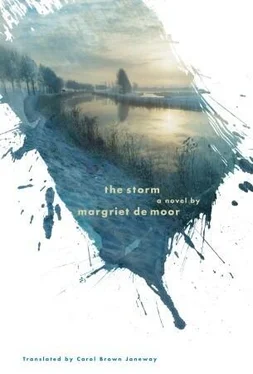Close together they walked along the narrow, crumbling sidewalk in front of the houses, then over a wooden footbridge and through underneath a landing stage, and finally down the middle of the street. The canal under the canopy of the new green leaves looked very welcoming in the sun.
She glanced sideways. He seemed to be sunk in thought. Would she ever appear out of the water? Did that ever happen? Hastily she began to talk.
“When you asked me last week about that pullover …”
He immediately said, “Lidy’s pullover.”
“Well, actually, mine.”
She saw him shrug uncomfortably. “In the end it didn’t belong to either of you.”
Last week they’d called him again. An investigator had told him about the body of a young woman whose physical description included a blue roll-neck pullover made of thin fleecy wool. The collar and sleeves were edged in a decorative pattern in paler blue, and one of the helpers, who was a keen knitter herself, recognized the pattern from Woman and Home magazine.
“Decorative pattern? Woman and Home?” Armanda repeated, when Sjoerd relayed the details to her. “Our pullover was only the one color. Made of angora. I bought it at Vos.”
Now she said, “Maybe you’ll think this is crazy, but it really did me good to talk, well, so normally about the pullover that Lidy swiped.”
He grabbed her arm hard. She was shocked. “Do you think it’s crazy?” she asked hastily.
They had reached the spot where a little arched bridge leads over from one canal to the next. They stopped at the balustrade. His grip on her arm became so tight that she looked at him.
“She has to come back to me,” he said. “It’s possible, you know that.”
She could hear that he was talking like a madman, but she too, as she realized, was listening to him like a madwoman as well, as he said, “I want to hold her tight again, hold her in my arms. Does that make sense?”
She looked at him unflinchingly.
“It makes absolute sense, Armanda. Think about it. Her and me. Our whole lives are still ahead of us!”
She turned away, confused. When he let go of her, there was an unpleasant tension between them. A barge appeared under the bridge. She watched as it traversed the crossing of the two canals, where trees and houses were reflected in the water, and continued toward the inner city. Was there any place he hadn’t been in the last months? she wondered. What had he seen? She knew any number of small things about him, the everyday routine, the rhythm of things in number 36 and number 77, but what about the big things? When he returned home from one of his trips, none of them at home knew how to deal with the combination of his grief and their own. Her mother would hastily lay another place at the table, her father would offer him a cigarette, and Jacob would steal glances at his face, lit up by the flame from the lighter. As far as they were concerned, words were unnecessary. “No.” A shake of the head. “Nothing.”
To break the ice between them, she said, “Listen, Sjoerd.” And asked him if she could maybe hear some more details about these journeys into hell. He looked at her for a moment, as if wondering where she found the courage to do that, then an odd weary look came into his eyes, as if he were getting ready to tell a story.
“Shall we go over the Amstelveld?” he suggested.
They were in warehouses, schools, the wholesale fish market in Yerseke. The morgues at the cemeteries were mostly too small for the number of dead who were recovered in the first two weeks. Because a large number of those drowned in Schouwen-Duiveland had been washed right across the Oosterschelde to Beveland, it made sense to at least take a look in the Great Church in Goes. There were things he’d had to get used to. He had been in a nursery school somewhere out on the Vierbannen polder where someone had lifted a cloth to show him the mortal remains of a young woman, still unidentified, underneath. The filth that was all that was left of a village, and the stinking horse lying on its side in the mud as if it had been poured into it, had prepared him for what he saw. It wasn’t her. Long, dark hair, age between twenty and thirty, teeth complete except for the two molars at the back: she would be identified during the course of the week by her husband, a tenant farmer in Capelle, by her clothing.
“You’ll receive word as soon as we hear anything new.”
So a day later he found himself in the church in Goes. A town that had survived unscathed, and a space dedicated to the Lord in which an immensely long row of corpses was laid out. Washed and wrapped in shrouds, they were awaiting identification and burial by their relatives. He arrived at around four o’clock. A buzz of voices; he was by no means the only one going round and searching. Shortly beforehand a Red Cross helper had shown him a national police report signed by the state attorney in Middelburg. Nails and toes well taken care of, he had read, skin color white, chin round, no calluses on hands. In consternation, he had nodded. Even the clothing seemed right, though he hesitated. Blue pullover, dark gray trousers with a zipper on the left-hand side, white underpants, white undershirt, pink shirt, gray men’s kneesocks. The Red Cross helper lifted a cloth from one of the tables that stood at the head of each bier. There lay the clothes and other objects as described to him. And when he said nothing, only nodded carefully, she pulled the cloth back farther so that he could see the face.
He screamed, “No!” and began to tremble violently.
Who has such a thing on their conscience?
Pointless question, which nonetheless kept running through his head as he made his way out of the nave by way of the transept that was dedicated to prayer but now was echoing with the stuttering cries of the eighteen-year-old girl who had recognized not just her parents but, totally unexpectedly, the boy she had been going out with, the murmuring of women with lists of names in their heads, the whispering of the man who had broken down at the sight of three blond children, in a row, their little muzzles completely eroded, and confirmed that yes, that was them, yes, yes, the three youngest of his four children. He had already pushed open the door of the vestibule when he heard, off to the right, the cheerful sound of men discussing a job. He looked over with something like relief. About eighteen or twenty feet away, through the open door, he saw a room, probably the presbytery, with a large number of coffins piled every which way on top of one another. On some of the coffins men were sitting in their work clothes, smoking and talking.
Out to the street! Cars, passersby, he looked upward. Was he trying to refer the nightmare to the heavens? He was more closely related to the men on the coffins, the excavators, the poachers, than he realized. For they were the ones who had been found by the health officials and the police to pull the bodies out from under the driftwood, fish them out of the water with pickaxes or their bare hands, and so it followed that they were also the ones who had pulled the woman he had viewed today out of the barbed wire. Nails and toes well taken care of . Once again, it hadn’t been her, no. But for a second, in the face with the empty eye sockets, he had seen Lidy’s features.
Weeks went by. Then there was a call from Zierikzee. The local body squad had found a woman, still young, whom the state identification team could describe only in the vaguest terms, clothing almost disintegrated, hair color no longer identifiable, left arm missing, feet approximately size nine. He borrowed a car from a friend and went to the cemetery. Hopeful, yes, as always. Come to look at the victim’s ring. Lidy had got married in a bright green silk suit; in the church on the Amstelveld he had slipped a ring with a little ruby onto her finger. Without paying attention to the graves, he went to the morgue, situated to the side of a path covered in tire tracks at the edge of a mudhole.
Читать дальше












